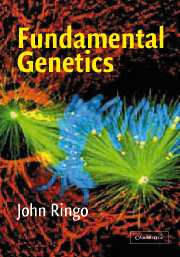Book contents
- Frontmatter
- Contents
- Preface
- Acknowledgments
- Chapter 1 Life Forms and Their Origins
- Chapter 2 Nucleic Acids
- Chapter 3 Proteins
- Chapter 4 Simple Chromosomes
- Chapter 5 Chromosomes of Eukarya
- Chapter 6 Genome Content
- Chapter 7 RNA Synthesis 1: Transcription
- Chapter 8 RNA Synthesis 2: Processing
- Chapter 9 Abundance of RNAs in Bacteria
- Chapter 10 Abundance of RNAs in Eukarya
- Chapter 11 Protein Synthesis
- Chapter 12 DNA Replication
- Chapter 13 Chromosome Replication
- Chapter 14 Molecular Events of Recombination
- Chapter 15 Micromutations
- Chapter 16 Repair of Altered DNA
- Chapter 17 Reproduction of Bacteria
- Chapter 18 Horizontal Gene Transfer in Bacteria
- Chapter 19 Cell Cycles of Eukarya
- Chapter 20 Meiosis
- Chapter 21 Chromosomal Abnormalities
- Chapter 22 Life Cycles of Eukarya
- Chapter 23 Reproduction of Viruses
- Chapter 24 Genetic Processes in Development
- Chapter 25 Sex Determination and Dosage Compensation
- Chapter 26 Cancer
- Chapter 27 Cutting, Sorting, and Copying DNA
- Chapter 28 Genotyping by DNA Analysis
- Chapter 29 Genetically Engineered Organisms
- Chapter 30 Genomics
- Chapter 31 Behavior of Genes and Alleles
- Chapter 32 Probability and Statistics Toolkit
- Chapter 33 Genes, Environment, and Interactions
- Chapter 34 Locating Genes
- Chapter 35 Finding and Detecting Mutations
- Chapter 36 Cytoplasmic Inheritance
- Chapter 37 Genetic Variation in Populations
- Chapter 38 Mutation, Migration, and Genetic Drift
- Chapter 39 Natural Selection
- Chapter 40 Quantitative Genetics
- Chapter 41 Speciation
- Chapter 42 Molecular Evolution and Phylogeny
- Glossary
- Index
Chapter 41 - Speciation
Published online by Cambridge University Press: 05 June 2012
- Frontmatter
- Contents
- Preface
- Acknowledgments
- Chapter 1 Life Forms and Their Origins
- Chapter 2 Nucleic Acids
- Chapter 3 Proteins
- Chapter 4 Simple Chromosomes
- Chapter 5 Chromosomes of Eukarya
- Chapter 6 Genome Content
- Chapter 7 RNA Synthesis 1: Transcription
- Chapter 8 RNA Synthesis 2: Processing
- Chapter 9 Abundance of RNAs in Bacteria
- Chapter 10 Abundance of RNAs in Eukarya
- Chapter 11 Protein Synthesis
- Chapter 12 DNA Replication
- Chapter 13 Chromosome Replication
- Chapter 14 Molecular Events of Recombination
- Chapter 15 Micromutations
- Chapter 16 Repair of Altered DNA
- Chapter 17 Reproduction of Bacteria
- Chapter 18 Horizontal Gene Transfer in Bacteria
- Chapter 19 Cell Cycles of Eukarya
- Chapter 20 Meiosis
- Chapter 21 Chromosomal Abnormalities
- Chapter 22 Life Cycles of Eukarya
- Chapter 23 Reproduction of Viruses
- Chapter 24 Genetic Processes in Development
- Chapter 25 Sex Determination and Dosage Compensation
- Chapter 26 Cancer
- Chapter 27 Cutting, Sorting, and Copying DNA
- Chapter 28 Genotyping by DNA Analysis
- Chapter 29 Genetically Engineered Organisms
- Chapter 30 Genomics
- Chapter 31 Behavior of Genes and Alleles
- Chapter 32 Probability and Statistics Toolkit
- Chapter 33 Genes, Environment, and Interactions
- Chapter 34 Locating Genes
- Chapter 35 Finding and Detecting Mutations
- Chapter 36 Cytoplasmic Inheritance
- Chapter 37 Genetic Variation in Populations
- Chapter 38 Mutation, Migration, and Genetic Drift
- Chapter 39 Natural Selection
- Chapter 40 Quantitative Genetics
- Chapter 41 Speciation
- Chapter 42 Molecular Evolution and Phylogeny
- Glossary
- Index
Summary
Overview
For all the sexually reproducing eukarya, the fundamental taxonomic unit is the species (s. and pl.). Biological species are populations of organisms between which reproduction is prevented biologically, by reproductive isolating barriers.
The birth of new species is speciation, during which one species splits into two reproductively distinct new species. The death of species is extinction. Speciation and extinction have produced, over the past two billion years, earth's diverse assemblage of extant species of eukarya, numbering ~107. The species of today are perhaps at most 1% of all species that have ever lived. Speciation is an inevitable by-product of genetic evolution. The exact genetic events that cause speciation are under intensive investigation.
Species Concepts
Phenotypic or Typological Species Concept
In the phenotypic concept, members of one species may vary quantitatively in form but are clearly distinct from members of another species. Individuals within species are considered variants of the same type. The phenotype is usually morphological, but it can be molecular. The Linnaean system of classification and binomial nomenclature for species (e.g., Homo sapiens) is purely phenotypic.
The main difficulty of this concept is that there is no evidence for the reality of a “true type,” from which individuals deviate, even though it is commonplace for species to appear distinct.
Biological Species Concept
According to this concept, biological species are reproductively isolated from each other. This concept applies only to sexually reproducing eukarya.
- Type
- Chapter
- Information
- Fundamental Genetics , pp. 395 - 401Publisher: Cambridge University PressPrint publication year: 2004



